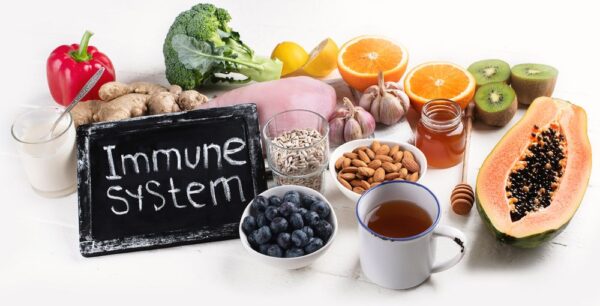wellhealthorganic.com:to-increase-immunity-include-winter-foods-in-your-diet-health-tips-in-hindi ; Winter is the season when our immune system needs extra support to fight off illnesses. Including superfoods in our diet can provide a natural boost to our immune system. Here are some essential tips for incorporating winter superfoods into your meals.Citrus Fruits: Oranges, grapefruits, and lemons are packed with vitamin C, which helps strengthen the immune system.Garlic: Known for its immune-boosting properties, garlic contains compounds that enhance the activity of immune cells.
Ginger: This root is known for its anti-inflammatory and immune-stimulating properties, making it an excellent addition to winter meals.Spinach: Loaded with vitamins and minerals, spinach supports immune function and provides antioxidant benefits.Turmeric: Its active compound, curcumin, has powerful anti-inflammatory and antioxidant effects, aiding the immune system.By incorporating these winter superfoods into your diet, you can fortify your immune system and stay healthy throughout the season.
“Many foods can help fight the cold wintery months and fulfil the need to modify nutrition in the body. Dietary habits will play an important role in keeping good health and immunity this season. But it is important to note that though we consume these winter-specific super-foods, a balanced diet should be maintained throughout the year with an intake of a wide range of food items,” says Dr. Siddhant Bhargava, Fitness and Nutritional Scientist, Co-Founder- Food Darzee.Here are 10 winter superfoods suggested by Coutinho and Bhargava that taste great and also minimise health issues during cold weather.
Also read : rajkotupdates.news : covid explosion on flight from italy
1. Ghee
Pure and ethically sourced A2 ghee is one of the most easily digestible fats that is capable of generating instant heat and energy to keep your body warm. A moderated consumption of ghee can also help keep skin from getting dry and flaky. Switch over to ghee as a cooking medium, or add it to your roti, rice, or khichdi during the winter season, says Coutinho.
2. Sweet potatoes
Shakarkandi or sweet potato is a winter delight you must indulge in. Available widely across the country, especially in winters, it is rich in fibre, vitamin A and potassium and high in nutrients. “Regular consumption can help in curing constipation, building immunity, and may reduce inflammation. A single piece of it is enough to provide a day’s worth of beta-carotene. It is good for developing a strong immune system, and fulfill the body’s vitamin C requirements. You can have it boiled with milk or even roasted,” says Bhargava.
2. Amla
wellhealthorganic.com:to-increase-immunity-include-winter-foods-in-your-diet-health-tips-in-hindi ; Nothing can beat the humble Indian gooseberry that comes packed with immunity-boosting vitamin C that helps to keep infections at bay. “You can have amla in the form of murabba, pickles, candies, chutneys, juice, or eat as is with a sprinkle of black pepper powder,” says Coutinho.
4. Dates
They not only taste great, but can also be used in a variety of desserts as a natural sweetener. Not to mention, they are packed with loads of health benefits. They are particularly beneficial for arthritis patients. “Dates, known to have healing powers, are a good source of vitamins, minerals, and fibres. Rich in calcium, dates help to keep bone and teeth strong during overcast days. It also has an important role in preventing bone-related issues like osteoporosis and arthritis,” says Bhargava.
Including it in morning and evening snacks increases stamina so that you do not feel lethargic and sluggish during cold winter days. Among many other benefits, dates nourish skin and keep the moisture level in check during harsh winter days.
5. Jaggery
This healthy sugar alternative has immense warming properties. Being rich in iron, it is also an excellent choice for anaemics. It is vital to maintain adequate iron levels during winters, as iron aids in binding oxygen to RBCs. The lower the iron levels, the lesser the availability of oxygen in the body, and the colder you feel. Jaggery also acts as a powerful lung cleanser and can benefit people living in high pollution and winter smog zones, says Coutinho.
6. Millets
wellhealthorganic.com:to-increase-immunity-include-winter-foods-in-your-diet-health-tips-in-hindi ; Millets are low-glycemic, high in fibre, and packed with a range of nutrients, vitamins, and minerals. “Essentially, all millets available during winters should be included in your diet. For instance, ragi, the ultimate winter food, gives you enough warmth for you to sail through chilled winters. Including it in your diet can help in losing weight as the amino acid present in it tends to reduce the appetite. Loaded with dietary fibre, ragi helps in improving digestion. It is known to help with conditions of insomnia, anxiety, and depression too. Also, bajra, rich in fibre and vitamin B promotes muscle gain and helps you keep warm in winters. It is also good for dense, frizz-free hair. A variety of cuisines can be made from it like bhakri, thalipeeth, etc,” says Bhargava.
“Winter is the best time to enjoy a hearty meal made out of bajra. This rustic grain is rich in fiber and increases blood circulation, thereby generating body health. One can make rotis (flatbreads), laddoos, crackers, or even khichdi from bajra. If your gut health is not a concern, it’s best to give your regular grains a break and turn to winter grains like bajra, maize, ragi, and so on,” says Coutinho.
7. Cruciferous vegetables
Broccoli and cauliflower, packed with fibre, vitamins, minerals, and beneficial antioxidants, help to protect against winter illnesses. “Rich in vitamin C, both these veggies boost the immune function of the body. They are also an excellent source of dietary fibre that play a major role in blood sugar control, digestive and heart health,” says Bhargava.
8. Root vegetables
wellhealthorganic.com:to-increase-immunity-include-winter-foods-in-your-diet-health-tips-in-hindi ; Nature provides us with an abundance of root vegetables this time of the year and for a good reason. Root vegetables are a rich source of beta carotene, fiber, potassium, and manganese, most of the B vitamins and antioxidants. E.g., Sweet potatoes, beets, yams, turnips, and carrots. Energetically speaking, these vegetables are great to make us feel grounded, says Coutinho.
9. Nuts
During winters, a regular intake of nuts, warm and hot in nature, among other things, ensures an active nervous system and helps to keep the heart and mind healthy. For instance, almonds and walnuts lower bad cholesterol, control blood sugar levels, and reduce inflammation. Almonds are rich in vitamin E, antioxidants, and magnesium, while walnuts are a great source of Omega-3. Do pick up a few nuts to munch on in between meals if you are craving a light snack, says Bhargava.
10. Mustard leaves or Sarso ka saag
Winters for Indians is the time to binge on platters of Sarso ka saag and makke ki roti that provide our body the heat that it needs during the cold weather. The combination is not only very delicious but loaded with powerful antioxidants like vitamin K, A, and C along with a variety of minerals. It provides benefits to people suffering from heart diseases, asthma, and menopausal symptoms and plays a major role in boosting immunity, says Bhargava.



